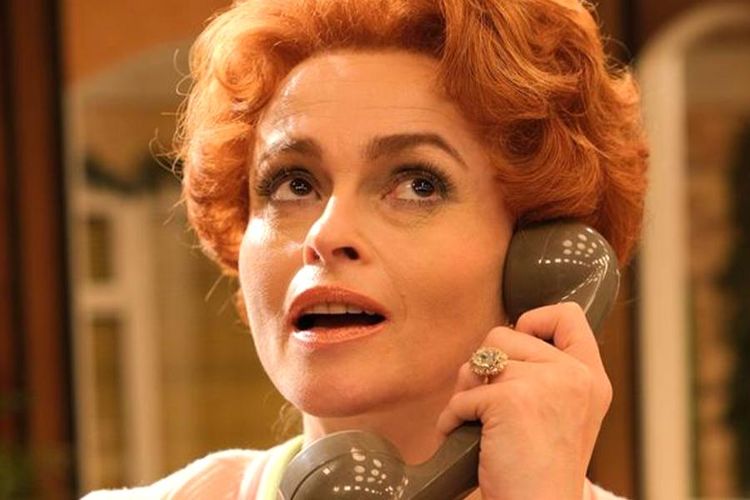Nolly, ITVX/STV Player, with Helena Bonham Carter as Noele Gordon

RUSSELL T Davies’ portrait of Noele Gordon, known to millions as Meg Mortimer in the long-running soap Crossroads, begins with the usual disclaimer about some scenes being invented.
We see Gordon taking part in a television test directed by a genial Scotsman. After introducing himself – “I’m John Logie Baird” – he tells the young Noele that she is the first woman in the world to appear on colour TV. Later she becomes the first woman to interview a Prime Minister on television.
Surely an overactive imagination is at work here, the viewer thinks.
Noele Gordon, star of a soap infamous for its wobbly sets and wooden acting, a television pioneer?
The diva with a reputation for being impossible a humble interviewer? The very same.
Davies, the writer who regenerated Doctor Who, has rather wonderfully done the same here with Gordon’s reputation, and what a giggle he has doing it, aided by Helena Bonham Carter playing Gordon, or Nolly as she liked to be called.
When we meet Nolly again it is 1975 and she is ten years into her stint on Crossroads.
TV with Alison Rowat: Scum, cowards and the hunting of Emily Atack
Ahead of her lies a brutal public sacking but for now she’s in full Queen of Sheba mode. Sweeping into rehearsals after being driven to the studio in a Rolls, she announces: “I think Pamela’s going to be late. I drove past her at the bus stop.”
Nolly rewrites the script as she goes, the crew too terrified to say anything, not least because her changes are spot on. She saw herself as the custodian of Crossroads on behalf of the 15 million viewers who watched it three nights a week.
Her producer attempts to usher in changes, at one point trying to sneak in a character with a working class Brummie accent to reflect the soap's Midlands roots. Nolly is having none of it. It's the RP way or the highway.
With its increasingly bizarre storylines, and what one might generously call modest production values, Crossroads would later be the inspiration for Victoria Wood’s Acorn Antiques. At times Davies and his superb cast come close to outdoing the spoof soap for laughs. The actors holding position between scenes because they couldn’t afford to stop recording; fake phone calls to fill time if the script was running short; all here.
Bonham Carter, though brilliant throughout, bears little resemblance to Gordon. The hair is not quite right, and she is girly and slight. Gordon, in memory at least, seemed more of an Amazon. Maybe it was the fur coat, back here in all its splendour. I'm still not sure what animal it was. Red squirrel maybe?
By 1981 the men upstairs get their way and refuse to renew Nolly's contract. She goes into shock and stays there. She cannot understand it. The question is asked over and over throughout the trio of hour-long episodes: “Why did they do it?” Her fans are in uproar, the red tops start petitions to save her.
The answer she eventually arrives at is on the face of it a simple one. “It was men. Just men. Being men.” She was probably right.
Save for her darling Tony Adams (who played Adam Chance in the soap) and Larry Grayson (Mark Gatiss doing his usual shape-shifting), Nolly is on her own, which makes the loss of her beloved Crossroads harder to bear.
Davies lavishes affection on his leading lady. Nolly turns out to be a sweetie who knows the birthdays of everyone at ATV and has performed many an act of kindness on the quiet.
Davies doesn’t quite have the cast and crew carry her out of the studio on their shoulders on her last day, but in spirit he comes close.
TV with Alison Rowat: 'It's do a deer as artist Grayson Perry asks what it means to be English'
Just as Nolly’s very early life barely gets a look in save for a mention of her “Scottish presbyterian” mother, her final years and her return to the theatre are done at a clip. Tears are shed and dried, the old trouper carries on.
For this is a celebration, not a wake. Ultimately we see Nolly not simply as a victim of men but of the changing television culture. It was the start of the 1980s, the beginning of a new era of brashness.
It was no coincidence that Nolly was sacked a year after JR Ewing was shot. The resulting frenzy, and huge leap in viewing figures, were the envy of producers the world over. What did a motel in Birmingham have to offer compared to that? Nolly was still big, in the eyes of her fans most of all, but not big enough for where the small screen was headed.







